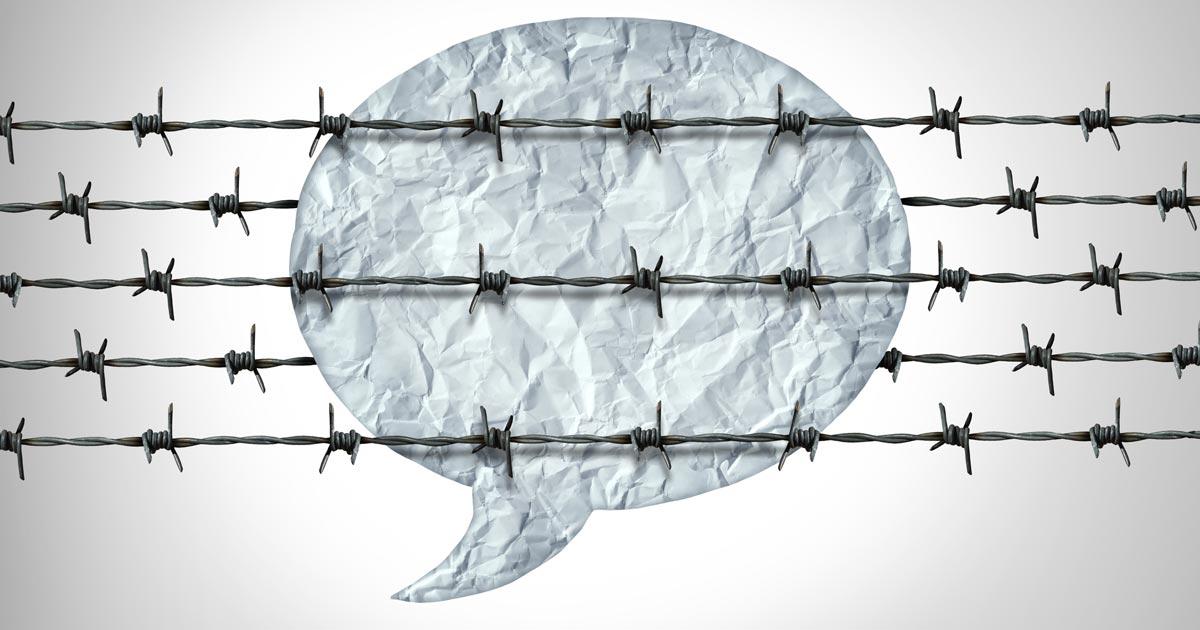
Governments, corporations, and elites have always been fearful of the power of a free press, because it is capable of exposing their lies, destroying their carefully crafted images, and undermining their authority. In recent years, alternative journalism has been growing and more people are relying on social media platforms as sources of news and information. In response, the corporate state, digital conglomerates, and the mainstream media have been increasingly supportive of the silencing and censoring of alternative media outlets and voices that challenge the official narrative on most issues.
At the recent World Economic Forum meeting in Davos, Switzerland, “Australian eSafety commissioner” Julie Inman Grant stated that “freedom of speech is not the same thing as a free for all,” and that “we are going to need a recalibration of a whole range of human rights that are playing out online—from freedom of speech … to be free from online violence.” Meanwhile, the Canadian government is seeking to restrict independent media and the freedom of expression via the implementation of Bill C-11, which would allow it to regulate all online audiovisual platforms on the internet, including content on Spotify, Tik Tok, YouTube, and podcast clients.
Similarly, the UK is seeking to introduce an Online Safety Bill, the US “paused” the establishment of a Disinformation Governance Board following backlash, and the European Union approved its own Digital Services Act, all of which aim to limit the freedom of speech. Attempts by elites and politicians to silence dissenters and critical thinkers is not something new. In fact, history is full of examples of “the persecution of men of science, the burning of scientific books, and the systematic eradication of the intelligentsia of the subjected people.”1
However, these current efforts to curtail freedom of speech and press by supposedly liberal governments are still somewhat ironic, given that even “the most intolerant of churches, the Roman Catholic Church, even at the canonization of a saint, admits, and listens patiently to, a ‘devil’s advocate.’ The holiest of men, it appears, cannot be admitted to posthumous honors, until all that the devil could say against him is known and weighed.”2
The corporate state, digital conglomerates, and the mainstream media want to ensure that they have the exclusive authority to dictate people’s opinions, wants, and choices through their sophisticated propaganda techniques. To do so, they have even resorted to transforming falsehoods into truth. In fact, the word truth has already had its original meaning altered, as those who speak the truth on certain subjects are now regularly accused of spreading hate speech, misinformation, and disinformation.
Presently, truth is no “longer something to be found, with the individual conscience as the sole arbiter of whether in any particular instance the evidence (or the standing of those proclaiming it) warrants a belief; it becomes something to be laid down by authority, something which has to be believed in the interest of the unity of the organized effort, and which may have to be altered as the exigencies of this organised effort require it.”3
However, modifying the definition of truth comes with the potential for great peril, as truth-seeking often contributes to human progress in that it leads to discoveries that ultimately benefit society at large. It should be noted that truth is by no means the only word whose meaning has been changed recently in order for it to serve as an instrument of propaganda; others include freedom, justice, law, right, equality, diversity, woman, pandemic, vaccine, etc. This is highly concerning, because such attempts at the “perversion of language, the change of meaning of the words by which the ideals” of the ruling class are expressed is a consistent feature of totalitarian regimes.4
As a number of liberal-democratic governments increasingly move toward totalitarianism, they want people to forget that there is “the greatest difference between presuming an opinion to be true, because, with every opportunity for contesting it, it has not been refuted, and assuming its truth for the purpose of not permitting its refutation.”5 According to them, “public criticism or even expressions of doubt must be suppressed because they tend to weaken public support.”6
In fact, they believe that all views and opinions that might cast doubt or create hesitation need to be restricted in all disciplines and on all platforms. This is because “the disinterested search for truth cannot be allowed” when “the vindication of the official views becomes the sole object” of the ruling class.7 In other words, the control of information is practiced and the uniformity of views is enforced in all fields under totalitarian rule.
The suppression of freedom of the press, speech, expression, and thought means that current and future generations will be “deprived of the opportunity of exchanging error for truth: if wrong, they lose, what is almost as great a benefit, the clearer perception and livelier impression of truth, produced by its collision with error.”8 They are also at risk of becoming ignorant of the fact that the only way in which a person can know “the whole of a subject” is by “hearing what can be said about it by persons of every variety of opinion, and studying all modes in which it can be looked at by every character of mind.”9 That is to say, current and future generations will be unaware that “the steady habit of correcting and completing” one’s own “opinion by collating it with those of others, so far from causing doubt and hesitation in carrying it into practice, is the only stable foundation for a just reliance on it.”10
At present, it is likely that the masses do not regard freedom of the press, speech, expression, and thought as being particularly important, because “the great majority are rarely capable of thinking independently, that on most questions they accept views which they find ready-made, and that they will be equally content if born or coaxed into one set of beliefs or another.”11 Nevertheless, no one should have the power and authority to “select those to whom” freedom of thought, enlightenment and expression is to be “reserved.”12
In fact, John Stuart Mill went so far as to claim that “if all mankind minus one, were of one opinion, and only one person were of the contrary opinion, mankind would be no more justified in silencing that one person, than he, if he had the power, would be justified in silencing mankind.”13 He further added that silencing the expression of an opinion is essentially an act of “robbing the human race,” which applies to both current and future generations.14 Even though the suppressors can deny the truth to people at a particular point in time, “history shows that every age having held many opinions which subsequent ages have deemed not only false but absurd; and it is as certain that many opinions, now general, will be rejected by future ages, as it is that many, once general, are rejected by the present.”15
If current efforts to suppress freedom of the press, speech, expression, and thought succeed, then the search for truth will eventually be abandoned and totalitarian authorities will decide what “doctrines ought to be taught and published.”16 There will be no limits to who can be silenced, as the control of opinions will be extended to all people in all fields. Accordingly, contemporary authoritarian policy makers need to be reminded about the crucial importance of freedom of speech, expression, and thought, which the US Supreme Court recognized in the 1957 case Sweezy v. New Hampshire when it ruled that
to impose any strait jacket upon the intellectual leaders in our colleges and universities would imperil the future of our Nation. No field of education is so thoroughly comprehended by man that new discoveries cannot yet be made…. Teachers and students must always remain free to inquire, to study and to evaluate, to gain new maturity and understanding; otherwise, our civilization will stagnate and die…. Our form of government is built on the premise that every citizen shall have the right to engage in political expression and association. This right was enshrined in the First Amendment of the Bill of Rights. Exercise of these basic freedoms in America has traditionally been through the media of political associations…. History has amply proved the virtue of political activity by minority, dissident groups, who innumerable times have been in the vanguard of democratic thought and whose programs were ultimately accepted. Mere unorthodoxy or dissent from the prevailing mores is not to be condemned. The absence of such voices would be a symptom of grave illness in our society.
1. F.A. Hayek, The Road to Serfdom (New York: Routledge 2006), p. 168.
2. John Stuart Mill, On Liberty (Kitchener: Batoche Books, 2001), p. 22.
3. Hayek, The Road to Serfdom, p. 167.
4. Hayek, The Road to Serfdom, p. 161.
5. Mill, On Liberty, p. 21.
6. Hayek, The Road to Serfdom, p. 164.
7. Hayek, The Road to Serfdom, p. 165.
8. Mill, On Liberty, p. 19.
9. Mill, On Liberty, p. 22.
10. Mill, On Liberty, p. 22.
11. Hayek, The Road to Serfdom, p. 168.
12. Hayek, The Road to Serfdom, p. 168.
13. Mill, On Liberty, p. 18.
14. Mill, On Liberty, p. 19.
15. Mill, On Liberty, p. 20.
16. Hayek, The Road to Serfdom, p. 165.




